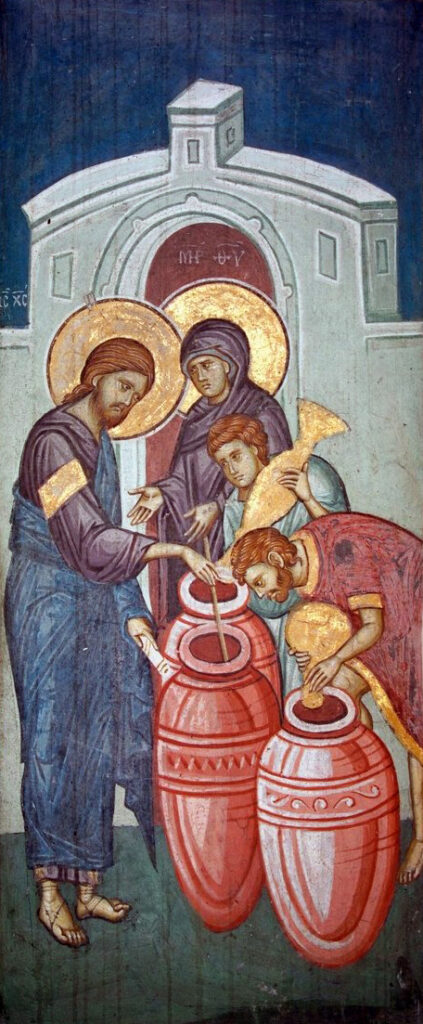The Epiphanies of the Lord
On the Feast of Epiphany, we celebrate more than the arrival of the magi from the East. This feast, which has been around since at east as far back as the fourth century, in addition to the visit of the magi, includes the Baptism of the Lord, and the wedding at Cana. Each of these events reveals something about Jesus. Before we get to those, let’s talk about what the name “epiphany” tells us about the celebration.
The name of the celebration, Epiphany, has its roots in Greek and means manifestation or appearance. In the Bible, the word is used when referring to he manifestation of God’s power over an oppressing army (2 Macc 15:27), his coming to earth to destroy death and restore life through the gospel (2 Tim 1:10), and several other places. Wikipedia tells me that in classical Greek usage, the word meant “appearance of dawn, of an enemy in war, but especially of a manifestation of a deity to a worshiper.” (This last one is a special kind of epiphany called a theophany.)
When we put all of this context around the word epiphany, it takes a slightly different character than what we might have in our heads: We are not celebrating a nice postcard image of a cute baby who got crazy expensive gifts from eastern proto-Christians. We are celebrating the God who created the universal taking on human flesh in order to manifest his divinity amongst humanity. We are celebrating the God whom Moses calls the “war man,” (Ex 15:3) telling us that God has the knowledge, power, and will to defeat his enemy, that is, to defeat evil and sin. We are celebrating the God shines his light on the whole of humanity, brings hope to the hopeless, and justice to those who have been mistreated. On Epiphany, we celebrate that God appeared, like the dawn, as a man named Jesus, that he came to make war on Satan and his evil minions, that he will cast the oppressive bonds of sin off his children, that he will destroy death, and that he will restore the promise of eternal life to all of us.
So… the Feast of Epiphany is important. In fact, it used to out-rank Christmas.
On this feast day, we celebrate three particular manifestations of God. It was four, but pretty early on the Nativity was split into its own feast. The first manifestation of God that we celebrate on Epiphany is the coming of the magi from the East. The magicians, also sometimes called wise men, watched the stars for signs. The appearance of a new star meant that a new king had been born, one with power over the heavens. These men set out on a long and treacherous journey to find this new king who had been foretold in a prophecy known well outside Israel, “A star shall come forth out of Jacob and a scepter shall rise out of Israel.” (Num 24:17) Upon finally reaching Bethlehem, they presented expensive gifts fit for a king: gold, frankincense, and myrrh. The symbolism of these gifts is unmistakable: gold reveals Jesus is king; frankincense reveals that he will offer prayer and sacrifice to the Father; and myrrh reveals that Jesus will die, something nobody would ever expect from God until he does it 30-some years later.
This article is getting a bit long and nerdy, so I’ll try and move it along a little bit.
The Baptism of Jesus, which now has its own feast day, reveals two things. First, Jesus is the Son of the Father, he is God, and the Father is well-pleased with him. Second, Jesus’s mission begins with repentance. Those who wish to follow him must repent of their sinful ways and turn toward him. This means leaving sin behind, just as the Israeli people left Egypt behind when they fled in the Exodus. The Children of Abraham passed through the Red Sea to leave a life of slavery and sin behind, and we, also children of Abraham because of our faith, leave sin behind through our own baptism.
The Wedding at Cana reveals many things about Jesus. We see at this wedding Jesus’s first public miracle. I think that the other critically important thing we see in the wedding at Cana is that Jesus is at a wedding, celebrating. Marriage and family is important to God. If we look at the history of salvation and God’s actions, he works through families to save the world: Noah’s family, Abraham’s family, Moses’s family, David’s family, Joseph’s family, and countless others. God loves the family, and through the family God will save the world. This is a reminder and a call to all of us to protect our families, to build them up, and to stand strong against the evil assaults that this world throws against our families.
There is so much more we can say about this incredible feast of Epiphany, but I’ll have to save it for another time.
